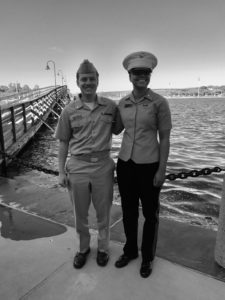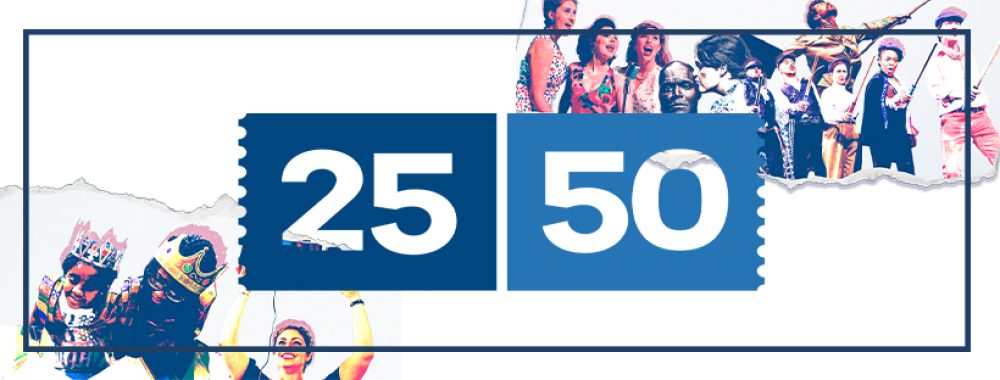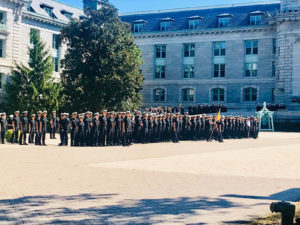Week Eleven: United States Naval Academy, Annapolis, Maryland
By Kaffe Keating
“What think you, sailors?”
– Viola, Act 1 Scene 2
“Before we get started, I’ve got a quick question for you…” I say, in the Irish lilt I use when I’m playing Feste. “How long have you been in the Navy?” I’m met with a wall of sound.
“All me bloomin’ life, sir! Me mother was a mermaid, me father was King Neptune. I was born on the crest of a wave and rocked in the cradle of the deep. Seaweed and barnacles are me clothes. Every tooth in me head is a marlinspike; the hair on me head is hemp. Every bone in me body is a spar, and when I spits, I spits tar! I’se hard, I is, I am, I are!” bellow the six-hundred midshipmen assembled in front of me. I actually steady myself, as if the noise alone would blow me over.
At least I was expecting it this time; the previous night’s audience caught me off guard when I opened the second half with “Anchors Away,” a song that all the Naval Officers learn when in training. Usually the site-specific second half opener garners a chuckle of recognition from the audience, with the bolder among them singing along a bit. Last night was something else entirely, as every sailor in the theatre blasted along with me, barrelling over the folky version of the song I’d worked out in my hotel room with the clear, invigorating original.
After the song last night, I was given a load of suggestions from both students and faculty about additional bits we could add into the show that would stir the Battalion into call and response. Hunter, a fourth year who’s been running our tech, was the one who told us to ask them all how long they’ve been in the Navy.
“They should all answer back with this thing we have to learn in Plebe Summer,” he says. “They make us learn a load of weird rhymes and songs, then they make us recite them while we’re doing loads of other complicated tasks and stuff. It’s to train our brains to be able to take on information quickly. I’d say there’s a strong eighty percent chance they’ll all do it.”
“What about the other twenty percent?”
“Oh, well they may just boo, you know? Depends.” God, I’m glad they didn’t – the chanting is scary enough.
I’m not sure exactly why the midshipmen have to learn a speech about being the spawn of a
mermaid, and why it’s in a cod (not sorry) British accent, but the pragmatic reasons for training them this way does make sense. There are lots of things that the Officers-to-be are made to do which seem bizarre and arbitrary at first, but soon reveal a practical root. My assumption was that everyone had to wear hats when outside just to look smart. But after hearing ‘No lid, no brain’ chanted jokingly by some students as they left one of my classes, a phrase that must have been drilled into them, the reason for forcing everyone into the habit of having their head covered when out in the open became abundantly clear.
The time when all the new midshipmen, or ‘Plebes’ as they’re not so affectionately referred to
(coming from the Latin ‘Plebians’, essentially the lowest of the low) learn all of these songs, rhymes and phrases is during the summer before they begin their training proper. It sounds intense. From what I could gather it’s weeks of no sleep, no free time, lots of Full Metal Jacket-style berating from superior officers and standing at attention learning poems and songs by rote from a tiny little book.
This all culminates in the observation of the terrifying tradition, featuring about a thousand plebes, all fighting to knock a dixie cap off the top of a monument in the centre of the USNA campus which has been coated in lard. This can take hours and apparently is televised every year. The first plebe to knock off the cap and replace it with a midshipman hat is said to be the first one in that year to become an admiral. It seems more likely they’ll be the first to receive a concussion.
“Oh yeah, you get a couple of broken arms every year. But it’s tradition, you know?” says Sam as he walks us across the yard, an extraordinarily pretty campus adorned by trees, a bandstand, and a load of cannons they nicked from us during the Revolution.
 Sam and Desiree are the ensigns who have been assigned to look after us for the week. They both graduated last year and so are now full-fledged officers, meaning the student midshipmen all have to salute them as they pass. Sam is training to become a Navy pilot and Desiree’s a Marine. An actual Marine. Far from the jarhead stereotype, though; they’re both charming, bright and smiley.
Sam and Desiree are the ensigns who have been assigned to look after us for the week. They both graduated last year and so are now full-fledged officers, meaning the student midshipmen all have to salute them as they pass. Sam is training to become a Navy pilot and Desiree’s a Marine. An actual Marine. Far from the jarhead stereotype, though; they’re both charming, bright and smiley.
Fun fact: the US Navy actually has more pilots than the Air Force – something I imagine it’ll be best not to mention when we get to the Air Force Academy in Colorado at the end of the tour.
Desiree’s older siblings both had a military education, and part of the reason she says she signed up was her perception of what the discipline instilled in them. How they matured more quickly, how the focus on being accountable for one another spurred them on into adulthood. Not only do you need to keep your own bunk clean and tidy – the corners of the bedspread folded to exact measurements – you also need to make sure your roommate is doing the same; you’ll both get yelled at even if only one of you has let the side down.
Not that we face a fraction of the stress or danger for which the midshipmen are being prepared, but there are some similarities between their training and what we undergo as actors. Both focus on physical and mental fitness, working in conjunction. Both require each individual to understand that they’re part of a whole; a small cog in a much larger machine which needs to serve its function well when it’s called upon, and to allow others to do so when it isn’t. They have their own set of heroes and myths, songs and poems, traditions and superstitions which exist in the collective consciousness.
I’m not big on theatre superstition myself (“Macbeth, Macbeth, Macbeth, Macbeth, Macbeth”), but my favourite of the bunch is the one about not whistling in a theatre. Supposedly, it dates back to when the stagehands operating the ropes would often be ex-sailors, hired for their knot-tying expertise. The sailors, having traded their crows’ nests for fly towers, would habitually communicate with each other using whistles of different pitches, a sound that would have cut through the bellowing winds of the high seas much more effectively than shouting ever could. A system that would have worked well, then, until some actor wanders through the wings absent-mindedly whistling Danny Boy to themselves, ending up with a chunk of scenery on their head. As I say, not a big one for superstition, but even I thought twice before whistling in the USNA theatre.
Annapolis is a sailing town, and it’s the annual boat show this weekend so the place is busy. It’s also incredibly pretty, quaint rows of multi-coloured, colonial-era houses criss-crossing away from the Maryland State Capitol in the centre of downtown out to the harbour, where you can find a host of pubs boasting eighteenth-century establishment dates. While it must feel like an ancient historical site to your average American, to us it feels like home. Streets which were paved in a time before cars were the main mode of transport, when things needed to be accessible by walking from place to place, rather than jumping behind the wheel.
Driving in to the Academy each day has proven to be more complicated than we expected. It’s a bit of a logistical nightmare. To be able to drive through the security gates, you need a security card. To be issued a security card, you need to get your fingerprint added to the database. To have your fingerprint added to the database, you need to bring your driver’s license, proof that the car is yours (or at least that the rental agreement is in your name), and you need to have filled out a long form at least ten days ahead of time. Despite the form having been filled out and sent on our behalf with time to spare, Al and Jono (our designated fingerprintees) still weren’t able to get their ID cards sorted. Luckily, Desiree and Sam came to the rescue, meeting us in the temporary parking bay outside before every class, and driving us on to the lot. Unlike the five of us, they didn’t complain once.
We were rewarded for our plight, however. After a long day of teaching, Al was given a present.
“One of me professors gave me this, it’s a coin. Look.” He says. He’s holding a coin, a bit bigger than a watch face, adorned with the crest of the US Naval Academy. “I think he felt bad about me having to do two forty-person classes on the trot in a lecture theatre with non-movable seats…”
“How did he give it to you?” I ask, reminded of something I heard about in a podcast I listen to.
“He shook my hand, and there it was,” he says.
It’s called a ‘Challenge Coin.’ A quick Google brings up the information I’m struggling to recall. Used throughout the US Military, Challenge Coins serve no official function but are more for boosting morale. You give someone a coin as a gift, usually in recognition of something they’ve achieved, by shaking their hand with the coin in your palm. It’s then their responsibility to keep it on their person at all times, in case they’re challenged. A challenge, or ‘coin check’, can be instigated by anyone in possession of their own coin, by pulling it out and rapping it on the bar. If you’ve got your coin, you pull it out and put on the bar too, but if you don’t you’ve got to buy a round of drinks for everyone who has. However, if everyone produces a coin, it’s then the challenger’s round. It’s a very cool thing to receive from an officer in the Navy.
My coin-envy abated, however, after our final class of the week. We were asked by Commander Mike Flynn, Sam and Desiree’s commanding officer, to help out with some mock interviews for some of the Academy’s top students who are seeking to gain a Rhode Scholarship to study at Universities at the UK. Thankfully, we weren’t being expected to comment on the content of the interviews (not all British people know what it’s like to go to Cambridge University), but to help the students with their interview technique; how to present themselves to a panel and keep control of any nerves that might spring up. In retrospect, it seems bizarre that we were teaching trained Naval Officers how to keep calm under pressure, but, as it turns out, we did have some pearls of wisdom to offer.
A few breathing exercises and tension-releasing stretches later, Mike shakes my hand, leaving
behind a shining silver challenge coin. He apologises that he’s only got two – Katherine receiving the other – but we’re not deprived of a full set for long. During a farewell tour of the yard, Desiree and Sam present Claire and Jono with a coin each too.
So we’ve all got one. I’ll have to remember to keep mine on me if I don’t want to be buying rounds for everyone for the rest of the trip.

